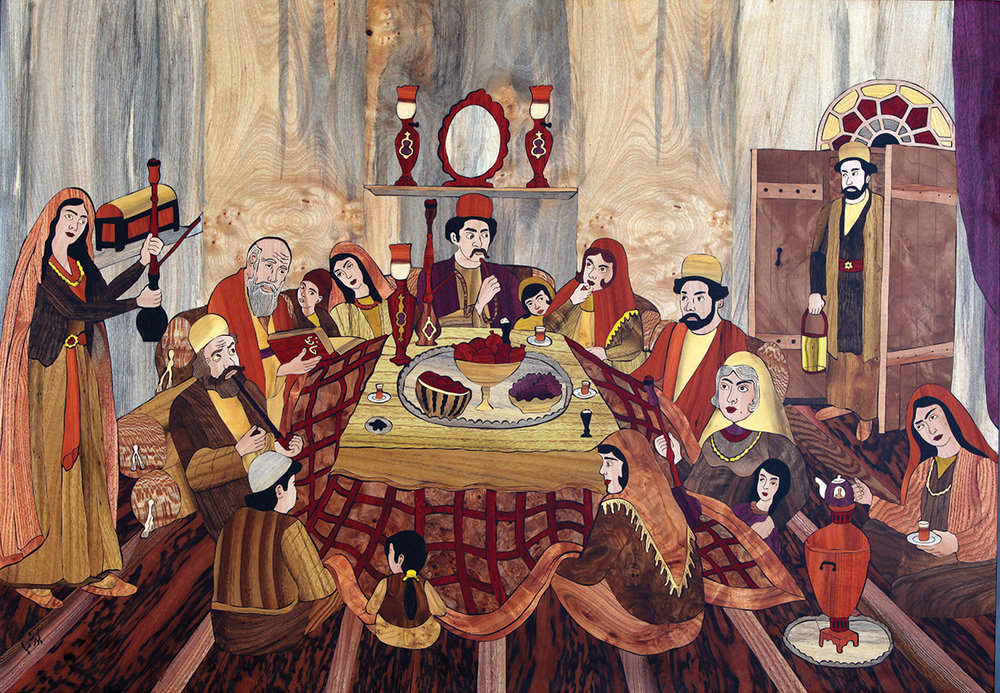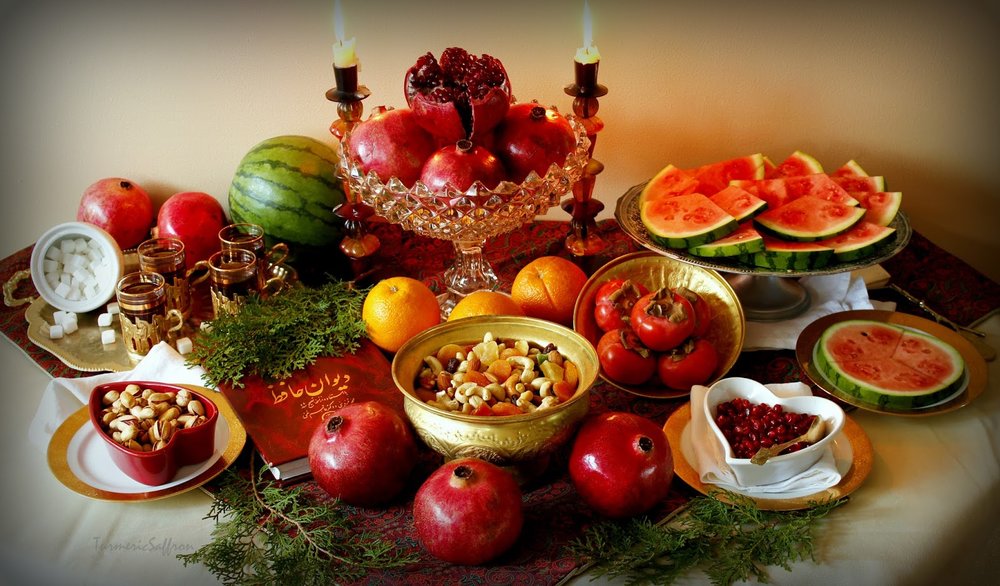Shab-e Yalda: A warm welcome to winter, felicitous farewell to fall

TEHRAN - Once again, Iranians from all walks of life and all around the globe are arranging to celebrate Shab-e Yalda (Yalda Night), which falls on December 20.
The auspicious yet thousands-year-old occasion, known as the longest and darkest night of the year, marks the last eve of autumn and the beginning of winter.
Shab-e Yalda is also called Shab-e Chelleh that literally meaning the night of the forty. One of the dominant features of the feast is Chelleh Neshini (sitting for Chelleh), a social context during which families and friends usually gather in the cozy ambiance of home of an elder such as grandparents, aunts or uncles to rejoice in warmth of one another’s company.
Some opt for making phone calls to friends and close relatives or send text messages to congratulate them on this night.
Guests are served with fresh fruits and colorful Ajil (a mixture of dry fruits, seeds and nuts) in bowls. To Iranians however, the dry fruits are somehow a reminiscence of the abundance of summer and the fresh fruits are an invocation for food during winter.

Watermelon and pomegranates as symbols of bounty are the traditional fresh fruits of this night. It is believed that eating watermelon before the arrival of winter can immunize one against cold and illness.
All food items are arranged on a spread known as Sofreh (traditional table cloth available in various materials and patterns), usually by women of the house.
Following a fresh and hot dinner, people recite poetry, narrate stories, chant, play musical instruments or just chat in the coziness of their company until midnight or so.
Of all ancient rituals, there are mostly two festivals that are unanimously celebrated by Iranians today, Yalda Night and the Persian New Year or Nowruz that means the birth of a new day.
From a wider point of view, human beings often mourn some endings and celebrate most beginnings. The Iranian nation has strong social and historical fibers to celebrate when it comes to the death of a season that gives birth to another.
Welcome to winter varies region to region
Yalda Night is celebrated in different parts of the country traditionally as a welcome to winter, though it encompasses regional variations and themes. In what follows some of them have been given:
Natives to the northwestern Azarbaijan region believe that eating watermelon will not let the cold of winter into their bones. Also, on this night, new brides carry gifts to brides-to-be of the family.
In Tabriz, the capital of East Azarbaijan Province, local musicians known as ‘Aashigh’ play traditional instruments and sing songs from ancient Persian legends on Yalda. Aashighs are local artists who play a great role in preserving oral culture and they can recite poetry spontaneously.
In the northwestern Ardabil Province, people ask the Chelleh Bozorg (first forty days of winter) to promise them to be moderate as they wish for a good winter time.
Families in the southern city of Shiraz, Fars Province, spread a Sofreh (Persian table cloth, mostly spread on the floor) which is not very different from the Persian New Year spread. They normally place a mirror and an artistic depiction of Imam Ali (AS), the first Shia Imam, on the spread. In addition to typical Yalda food items, Halva Shekari (a kind of paste made of sugar, butter and sesame seeds) and Ranginak (Persian date cakes) are also served.
In the northern province of Gilan, however, Yalda is never complete without watermelons. It is assumed that anyone who eats watermelons on this day would not be thirsty in summer and cold in winter. Aoknous is a tempting and indispensable Gilani dish on Yalda Night.
People in the southeastern Kerman Province stay up most part of the night to welcome the arrival of the legendary Gharoun (Croesus) who is believed to bring wood for poor families in the disguise of a woodcutter. The wood logs would then turn into gold and bring prosperity and luck to the house. The ritual is of course a symbolic one.
One of the oldest Yalda rituals in the western Lorestan Province was when a group of small and teenage boys would go to the rooftops of houses and throw down their bags tied to the end of a long scarf from the chimney holes. They would sing songs, wishing prosperity and happiness for the owner who would fill their bag with Yalda treats. The children would state their gratitude accordingly by singing songs of merriment.
In the villages of northeastern Khorasan Province the groom’s family sends out gifts with a group of musical instrument players to the bride-to-be’s house. In this province, after dinner and festivities, people read out verses from the Shahnameh, a long epic poem by illustrious Persian poet Ferdowsi.
In one of the villages of Garmsar, north-central Semnan Province, people of one family or clan get together over a meal of khorous polo (cockcrow meat and rice dish), after which they chitchat with jokes, anecdotes and short stories.
It is customary for people in the western province of Kermanshah that they stay up most of the night by eating, singing and telling stories to abide with the mother of the world in giving birth to her daughter, the sun.
Good to know
- Yalda Night is celebrated on the last day of Azar (the last month of autumn) and before the first day of Dey (the first month of winter).
- Watermelon and pomegranate are amongst the most distinguished features of Yalda Night, though a few days before Yalda, the fruits’ prices may soar.
- Yalda, though not very common, is a female Persian name.
- In ancient Iranian calendar, winter is divided into two parts, Chelleh Bozorg (the bigger forty) from 22nd of December to 30th of January and Chelleh Koochak (the smaller forty) from 30th January to 10th of March.
- The word Yalda, meaning birth, was imported from Syriac into the Persian language by the Syriac Christians.
- Narratives say that Yalda Night marks the birth of winter and the triumph of the sun as the days grow longer and colder.
- Ancient Iranians assumed Naneh Sarma begins to descend on earth by Yalda Night. Literally meaning coldness grandma, Naneh Sarma is a folklore Persian character who brings in the coldness during the wintertime.
PHOTO: A marquetry work by artist Qumars Sayyad depicts a rural Iranian family reunion celebrating the Yalda Night.
AFM/MG
Leave a Comment